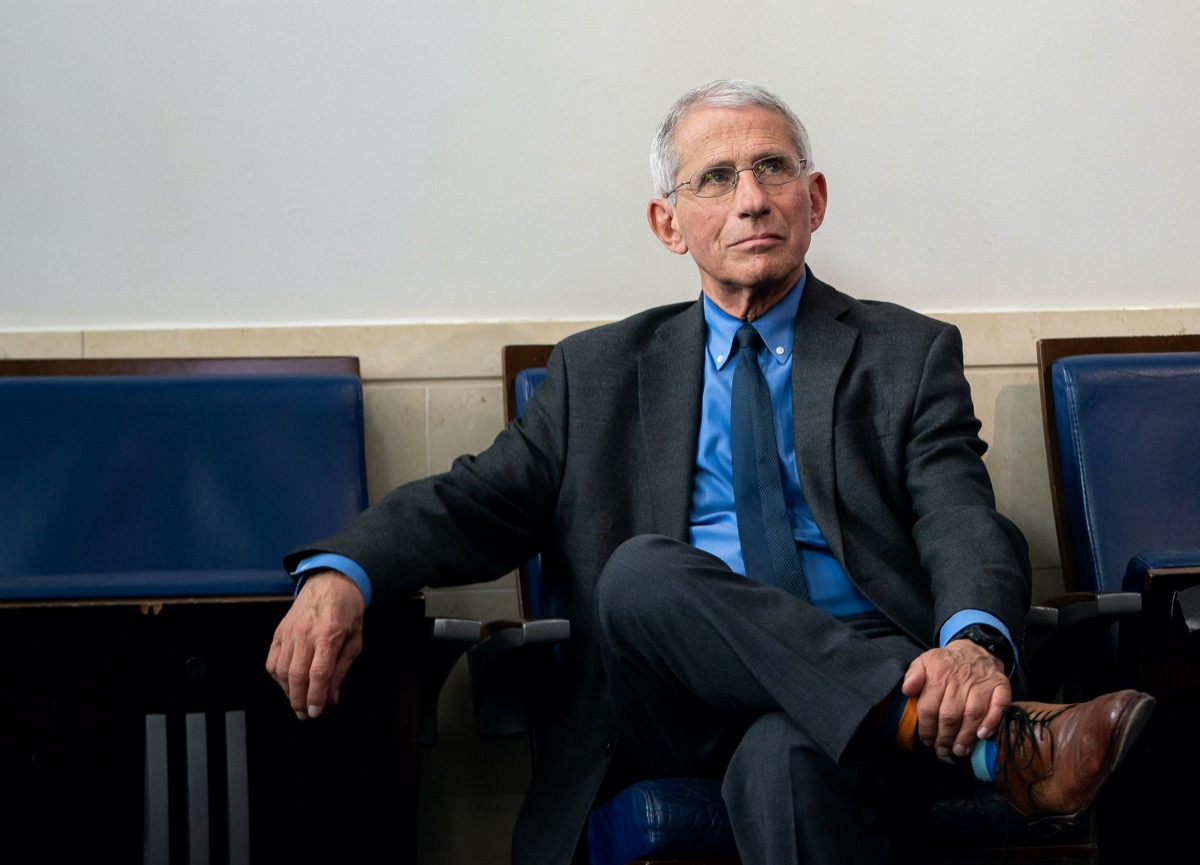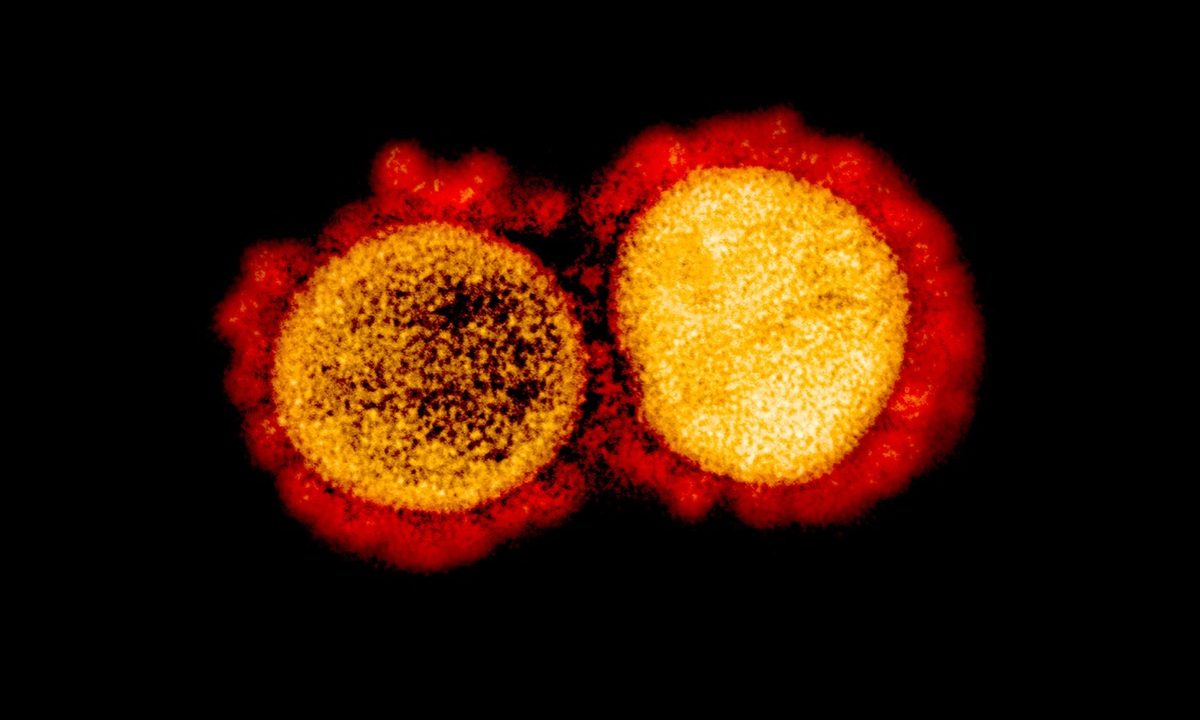Anthony Fauci Gives Advice On How To Reopen The United States
From second waves to vaccines, “America’s doctor” gives advice on how the country should reopen after COVID-19.
This story is a part of Science Friday’s coverage on the novel coronavirus, the agent of the disease COVID-19. Listen to experts discuss the spread, outbreak response, and treatment.

As states in the country begin to reopen, many people want to know: Could it cause a second wave of coronavirus outbreaks? It was one of the most popular questions among our listeners when Anthony Fauci, director of the National Institute of Allergy and Infectious Diseases and the physician who has been a primary consultant on COVID-19 to the U.S. government, joined us this week on Science Friday.
Reopening requires caution, he says. Over the past decades, we have never experienced a shutdown on such a global scale.
“That certainly contained what would have been a much more massive global outbreak, but you can’t stay locked down forever,” he says. “That’s the reason why we’re trying to carefully and prudently, with guidelines, get back to a degree of normality, and we’ve never ever had that situation before.”
During the interview, Fauci digs further into the country’s reopening. He looks ahead at what we may face in the future and shares advice on how we can best prepare. Read the highlights below.
On the spikes in case numbers and hospitalizations in recently open states, including Texas, Arizona, Utah, North Carolina, and Florida.
Anthony Fauci: It’s not unexpected. This virus was so easily transmissible and we successfully mitigated it by essentially shutting down the country, going into lockdown. It wasn’t just us, the rest of the world did the same thing. There’s a recent paper that came out showing that the closing down of society globally has saved hundreds of millions of infections and at least a few million deaths. So, we know that mitigation works.
When you pull back and try to re-enter a degree of normality, you can expect that there will be blips of infection. Whether those infections become real rebounds is going to depend on how effectively you address it by identification, isolation, and contact tracing. So, you are correct that we are seeing these little blips now, in several states throughout the United States. I hope that we can contain them effectively with the tools that we have.
“The closing down of society globally has saved hundreds of millions of infections and at least a few million deaths.”
On the cause of any resurgence of cases, such as recent congregations in protests or reopening of businesses and spaces.
I think it’s gonna probably be a combination of both. Whenever you get a congregation of people together, hopefully everyone will be wearing a mask. But even with a mask, there’s still a risk when you have crowds. It was just reported yesterday evening [June 9th, 2020] that certain members of the D.C. national guard who were trying to contain the demonstrations in my city of Washington, D.C., tested positive. Again, that’s unfortunate, but not surprising, because when you have the congregation of people in a crowd, that’s when you get spread. And that’s the thing we’re concerned about.
On the calls for people who participate in marches and protests to be tested—and if there are enough tests available to support the demand.
Obviously, if you have the capability and the facilities to do that, you could get a good feel for exactly what impact, if any, [in] that congregation of people during the demonstrations. So I would agree that if you’re able to do that, you would get important information.
We got off to a slow start in the very early weeks of the outbreak as it was recognized here in the United States. But right now, the testing numbers and capability and capacity is significantly better than it was. And as we look forward, as we enter into the next weeks and months into the summer, it should get even better. So, I do not believe that testing will continue to be a problem going forward.
On whether shutdowns will be as effective if infections begin to rise again in the United States over the year.
I hope that we don’t get into that situation, where when we get infections, we cannot contain them with an adequate degree of identification, isolation, and contact tracing. As we start to open up the country to try and get back to some degree of normality, there will be blips of infection. That’s going to be inevitable. Whether those infections turn into a real resurgence of infections will depend on how effectively we’re able to identify, isolate, and contact trace. If we don’t do that effectively, we may need to pull back from containment back into mitigation, which we know is effective, because we clearly have proof that that did blunt the outbreak.
“As we start to open up the country to try and get back to some degree of normality, there will be blips of infection. That’s going to be inevitable.”
On when to expect a vaccine as states reopen.
We’re going into an advanced, phase three trial in the beginning of the summer with more than one [vaccine] candidate. And it’s going to be a very large trial involving tens of thousands of individuals.
And we hope that by the time we get into the mid- to late-fall, if things work out okay—if we don’t get into any unanticipated speed bumps, or potholes—that by the end of this calendar year and the beginning of 2021, that we will have a vaccine, or maybe more than one vaccine, that we will be able to deploy and utilize to protect people.

On whether people will be hesitant to take the vaccine due to misinformation.
That’s always a worry that I have. It dates back to the vaccine hesitancy around measles that resulted in the unfortunate rebound and resurgence of measles in a country that had essentially eliminated measles. I’m always concerned about the general anti-science attitude and particularly the anti-vaccine attitude.
So we have to intensify what we call “community outreach,” to be very transparent with the community, to talk to them about the trials, to ensure that in the conduct of trials, we don’t compromise safety, and we don’t compromise scientific integrity. We’ve got to be very open and honest and transparent, about that, and reach out to the community, so they won’t be hesitant to take a vaccine, which could be life saving for them.
“One of the things I’m fairly certain about is that this virus is not going to disappear from the planet,” Fauci says. “It is such a highly efficient spreader from human to human.”
On if the pandemic will spread until the vaccine is ready, if it’ll burn out on its own, or if we’ll see infections plateau at a high rate.
All of the above [scenarios] are possible. One of the things I’m fairly certain about is that this virus is not going to disappear from the planet, the way SARS did, because it is such a highly efficient spreader from human to human. That somewhere, someplace on the planet, we’re always going to have an infection. It’s going to be up to us to contain it.
If we get a successful vaccine, as [has been seen] with other viral infections, we will be able to control and maybe even eliminate it in certain countries and certain regions of the world. I do believe we will see continued infections for some time. Whether those infections become true outbreaks, again, is going to really depend on our ability—the manpower, the resources, the testing capability—to identify, isolate, and contact trace so that blips of infection, which are inevitable, don’t turn out to be true rebounding and resurging of a lot of infections.
On Fauci’s optimism going forward.
I’m always cautiously optimistic about these things, because I feel that we can put in an effort that could contain it. If left to its own devices, the virus would be out of control. But that’s not happening, because we’re doing something to contain it.
The transcript has been edited lightly for length and clarity. Listen to the full Science Friday interview on June 11, 2020.
Invest in quality science journalism by making a donation to Science Friday.
Lauren J. Young was Science Friday’s digital producer. When she’s not shelving books as a library assistant, she’s adding to her impressive Pez dispenser collection.
Dee Peterschmidt is a producer, host of the podcast Universe of Art, and composes music for Science Friday’s podcasts. Their D&D character is a clumsy bard named Chip Chap Chopman.